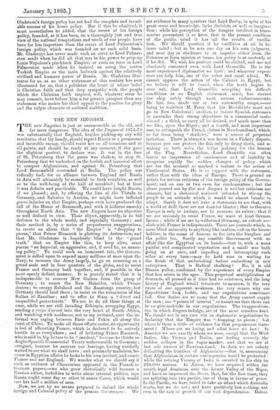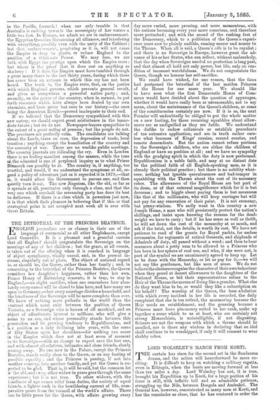T HE new Jingoism is just as unreasonable as the old,
and far more dangerous. The idea of the Jingoes of 1874-79 was substantially that England, besides picking-up any wild territories that lay handy, should regard Russia as a permanent and incurable enemy, should resist her on all occasions and at all points, and should be ready at any moment, if she gave the slightest pretext, to declare war. It was in the face of St. Petersburg that the purse was shaken, to stop St. Petersburg that we embarked on the foolish and immoral effort to conquer Afghanistan, and against St. Petersburg that Lord Beaconsfield contended at Berlin. The policy was radically bad, for an alliance between England and Russia in Asia will ultimately be essential to both countries, as well as to the well-being of the half of mankind ; but at least it was definite and practicable. We could have fought Russia, if we pleased ; and, by offering the line of the Vistula to Germany, and Salonica to Austria, we might have inflicted grave injuries on that Empire, perhaps even have produced the fall of the House of Romanoff, and with it hideous anarchy throughout North Asia. The new Jingoes have no objective so well defined in view. Their object, apparently, is to bid defiance to the whole world, and especially Germany ; and their method is, by a series of preposterous exaggerations, to create an alarm that " the Empire" is "dropping to pieces," that Prince Bismarck is plotting its destruction, and that Mr. Gladstone is hopelessly blind to the " grand truth" that an Empire like this, to keep alive, must pursue " an Imperial, an aggressive, and, if need be, an annexing policy." To avoid such an imminent fate, the Government is called upon to expend many millions at once upon the Navy, to increase the Army largely, to go on annexing on a grand scale and in four quarters of the globe, and to resist France and Germany both together, and, if possible, in the most openly defiant manner. It is gravely stated that it is indispensable to recover New Guinea from the grasp of Germany ; to annex the New Hebrides, which France desires ; to occupy Zululand and the Amatonga country, lest Germany should land there ; to insist on the submission of the Sultan of Zanzibar ; and to offer to Siam a "direct and unqualified protectorate." We are to do all these things at once, while we are still invading Ethiopia, occupying Egypt, sending a corps d'arnze'e into the very heart of South Africa, and watching with assiduous, not to say irritated, care the informal war raging between Paris and Pekin all along the coast of China. To make all these efforts easier, no opportunity is lost of affronting France, which is declared to be actively hostile to us everywhere ; and of irritating Prince Bismarck, who is said in big letters to be " insolent," because he thinks an Anglo-Spanish Commercial Treaty unfavourable to Germany ; arrogant, because he annexes our leavings, having carefully waited to see what we shall leave ; and personally malicious, because in Egyptian affairs he looks to his own interest, and courts France and not England. We wonder what we should say if such an outburst of Chauvinism appeared in the French or German papers,—we who grow rhetorically wild because a Russian editor, forbidden to write about internal politics, says Russia ought some day or other to annex Corea, which would cost her half a million of men.
Now, we are by no means prepared to defend the whole foreign and Colonial policy of the present Government. We
see evidence in many quarters that Lord Derby, in spite of his great sense and knowledge, lacks decision, as well as imagination ; while his perception of the dangers involved in transmarine possessions is so keen, that in the present condition of the public mind it has all the results of vacillation. We should question if he vacillates at all in his inner mind ; but as he acts one day on his own judgment, and next day in obedience to an impulse either from the Colonies or from opinion at home, his policy is as unsteady as if he did. We wish his position could be shifted, and are not absolutely contented even with Lord Granville. He is the most experienced diplomatist we have ; and wherever experience can help him, one of the safest and most adroit. We cannot approve the action of the Cabinet in Egypt, but we believe it will be found, when the truth begins to ooze out, that Lord Granville, accepting his difficult conditions as an English statesman must, has steered the ship safely through most serious embarrassments. He has, too, made one or two noteworthy coups,—one being to convince M. Ferry that his R6cidivists must not go to New Caledonia ; another, to induce Spanish statesmen to surrender their strong objections to a commercial modes vivendi ; a third, to carry all he desired, and much more than we like, upon the Niger ; and a fourth, and most important one, to extinguish the French claims in Newfoundland, which, so far from being "shadowy," were a source of perpetual irritation. There is always a war latent in a Fishery dispute, because you can protect the fish only by firing shots, and so waking on both sides the bitter jealousy for the honour of the Flag. Nevertheless, Lord Granville too often leaves an impression of carelessness and of inability to recognise rapidly the sudden changes of policy which are for the moment so marked a feature in the action of Continental States. He is en rapport with the statesmen, rather than with the ideas of Europe. There is ground on points for serious criticism of the foreign policy of the Government, and on one or two even for condemnation ; but the abuse poured out by the new Jingoes is neither criticism nor censure, but a rhetorical outburst intended to stir-up the people to an attitude which it would be almost lunatic to adopt. Surely it does not take a statesman to see that, with a world at drill, these are not days for bluster ; that to threaten Europe is only to irritate, not to overawe its rulers ; that if we are seriously to resist France, we want at least German. favour ; while if we are to withstand Germany, an entente cordiale with France is indispensable. There are journals which, in mere blind animosity to anything like caution, call on the householders, in the name of honour, to fire into the burglars and the police too. Surely any sensible Government with an affair like the Egyptian on its hands—that is, with a most painful and complicated negotiation and a small war both going on at once, and impeding and interrupting each other at every turn —may be held wise in waiting for the finish of that undertaking before embarking in new
enterprises. That is Radical skulking ? No, it is old Roman policy, confirmed by the experience of every Empire
that has arisen in the ages. This perpetual multiplication at
demands, all pressed as if time had no existence, and the long history of England would terminate to-morrow, is the very cause of our apparent weakness, the very reason why our Expeditions look feeble, and our negotiations sometimes fail. Our duties are so many that the Army cannot supply the men ; our " points of interest" so numerous that there can be no give-and-take in our negotiations. The exaggerations, too, in which Jingoes indulge, are of the most senseless kind. We should not in any case win in diplomatic negotiations by declaring that the Empire was " dropping to pieces ;" but where is there a tittle of evidence for that preposterous statement ? Where are we losing, and what have we lost ? In America we are exactly where we were, except that the West Indies, like Vienna and Berlin, are feeling severely the sudden collapse in the sugar-market, and that we are at last sole owners of Newfoundland. In Asia, we are calmly. delimiting the frontiers of Afghanistan—that is, announcing that Afghanistan in certain contingencies would be protected ; while the retiring Viceroy of India is escorted to his ship by 250,000 natives. In Africa, we have acquired within the month legal dominion over the Lower Valley of the Niger, and have so impressed the Boers, that, for the first time, they are splitting into two parties, one of them in favour of peace. In the Pacific, we have failed to take an island which Australia wants, but we do not ; and have positively lost nothing, not even in the rate of growth of our vast dependencies. Defeat
in the Pacific, forsooth ! when our only• trouble is that Australia is rushing towards the sovereignty of her waters a little too fast. In Europe, we admit we are in embarrassment, the Egyptian Question threatening all alliances, and interfering with everything, possibly even with the unity of the Cabinet ; but that embarrassment, perplexing as it is, will not cause the Empire to drop to pieces, or reduce England to the position of a third-rate Power. We may lose, we are told, with Egypt the prestige upon which the Empire rests ; but where is the proof that it does rest on anything so shadowy ? If it does, the Empire must have tumbled through a great many times in the last thirty years, during which there has never been an autumn in which this cry has not been heard. The truth is, the Empire rests, first, on the justice with which England governs, which prevents general revolt, and gives us everywhere a powerful native party ; and, secondly, on the power of the country, when in earnest, to put forth resources which have always been denied by our own alarmists, and have never but once in our history—the once being the American Revolt—proved inadequate to their end. If we believed that the Democracy sympathised with this new outcry, we should expect great misfortunes in the immediate future ; but we do not. Newspaper-buyers sympathise to the extent of a great outlay of pennies ; but the people do not. The provinces are perfectly calm. The candidates are talking about the Lords, taxes on corn, the depression of trade, local taxation ; anything except the humiliation of the country and the necessity of war. There are no warlike public meetings. The country journals are ridiculing the cry. Even in London there is no feeling manifest among the masses, while the tone of„,the educated is one of perplexed inquiry as to what Prince Bihmarck can possibly be at. The country is, if anything, too trustful, and would, if we understand the symptoms at all, regard a policy of adventure just as it regarded it in 1879,—that is, it would allow the Government to pursue one, and then quietly turn it out. The new Jingoism, like the old, so far as it spreads at all, penetrates only through a class, and that the very-one which one-half the screaming party has done its best to dethrone. If there is a class which is powerless just now, it is that which finds pleasure in believing that if this or that strategical point is not occupied next week all is over with Great Britain.











































 Previous page
Previous page